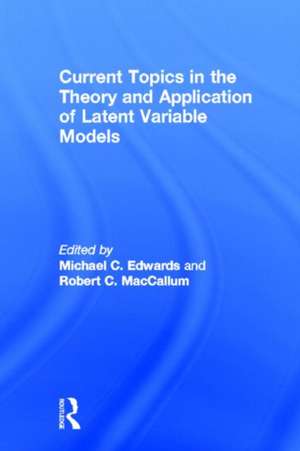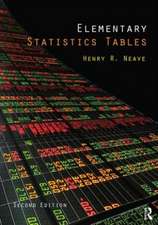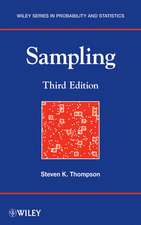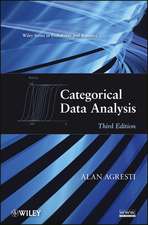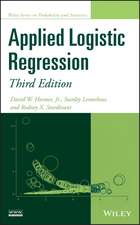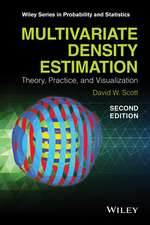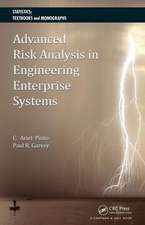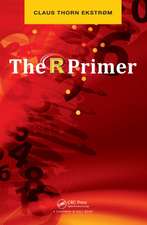Current Topics in the Theory and Application of Latent Variable Models
Editat de Michael C. Edwards, Robert C. MacCallumen Limba Engleză Hardback – 6 dec 2012
The book is divided into two sections, although several chapters cross these content boundaries. Part one focuses on complexities which involve the adaptation of latent variables models in research problems where real-world conditions do not match conventional assumptions. Chapters in this section cover issues such as analysis of dyadic data and complex survey data, as well as analysis of categorical variables. Part two of the book focuses on drawing real-world meaning from results obtained in LVMs. In this section there are chapters examining issues involving assessment of model fit, the nature of uncertainty in parameter estimates, inferences, and the nature of latent variables and individual differences.
This book appeals to researchers and graduate students interested in the theory and application of latent variable models. As such, it serves as a supplementary reading in graduate level courses on latent variable models. Prerequisites include basic knowledge of latent variable models.
| Toate formatele și edițiile | Preț | Express |
|---|---|---|
| Paperback (1) | 467.44 lei 6-8 săpt. | |
| Taylor & Francis – 6 dec 2012 | 467.44 lei 6-8 săpt. | |
| Hardback (1) | 765.84 lei 6-8 săpt. | |
| Taylor & Francis – 6 dec 2012 | 765.84 lei 6-8 săpt. |
Preț: 765.84 lei
Preț vechi: 1028.36 lei
-26% Nou
Puncte Express: 1149
Preț estimativ în valută:
146.54€ • 152.70$ • 121.34£
146.54€ • 152.70$ • 121.34£
Carte tipărită la comandă
Livrare economică 03-17 aprilie
Preluare comenzi: 021 569.72.76
Specificații
ISBN-13: 9781848729513
ISBN-10: 1848729510
Pagini: 296
Ilustrații: 45 b/w images, 27 tables, 12 halftones and 33 line drawings
Dimensiuni: 152 x 229 mm
Greutate: 0.54 kg
Ediția:New.
Editura: Taylor & Francis
Colecția Routledge
Locul publicării:Oxford, United Kingdom
ISBN-10: 1848729510
Pagini: 296
Ilustrații: 45 b/w images, 27 tables, 12 halftones and 33 line drawings
Dimensiuni: 152 x 229 mm
Greutate: 0.54 kg
Ediția:New.
Editura: Taylor & Francis
Colecția Routledge
Locul publicării:Oxford, United Kingdom
Cuprins
M. C. Edwards, R. C. MacCallum, Introduction: Complexity and Meaning in Latent Variable Modeling. Part I. Complexities in Latent Variable Modeling. R. Cudeck, J. R. Harring, Estimating the Correlation between Two Variables when Individuals are Measured Repeatedly. R. Gonzalez, D. Griffin, Deriving Estimators and Their Standard Errors in Dyadic Data Analysis: Examples Using a Symbolic Computation Program. P. F. Craigmile, M. Peruggia, T. Van Zandt, A Bayesian Hierarchical Model for Response Time Data Providing Evidence for Criteria Changes Over Time. I. Moustaki, A Review of Estimation Methods for Latent Variable Models. G. Zhang, C.T. Lee, Standard Errors for Ordinary Least Squares Estimates of Parameters in Structural Equation Modeling. L. Cai, Three Cheers for the Asymptotically Distribution Free Theory of Estimation and Inference: Some Recent Applications in Linear and Nonlinear Latent Variable Modeling. K. A. Duncan, S. N. MacEachern, Nonparametric Bayesian Modeling of Item Response Curves with a Three Parameter Logistic Prior Mean. W. A. Nicewander, Exact Solutions for IRT Latent Regression Slopes and Latent Variable Intercorrelations. S. du Toit, Analysis of Structural Equation Models Based on a Mixture of Continuous and Ordinal Random Variables in the Case of Complex Survey Data. Part II. Drawing Meaning from Latent Variable Models. R. E. Millsap, A Simulation Paradigm for Evaluating Approximate Fit. R. C. MacCallum, T. Lee, M. W. Browne, Fungible Parameter Values in Latent Curve Models. A. Shapiro, Statistical Inference of Moment/Covariance Structures. J. L. Rodgers, W. H. Beasley, Fisher, Gosset, and Alternative Hypothesis Significance Testing (AHST): Using the Bootstrap to Test Scientific Hypotheses about the Multiple Correlation. S. M. Boker, M. Martin, On The Equilibrium Dynamics of Meaning. K. Tateneni, M. Schiller, Applying Components Analysis to Attitudinal Segmentation.
Notă biografică
Michael C. Edwards is an Associate Professor in the Quantitative Area of the Department of Psychology at The Ohio State University. He received his PhD in 2005 from the L.L. Thurstone Psychometric Laboratory at the University of North Carolina at Chapel Hill. His research focuses on measurement issues in the social sciences with specific topics including multidimensional item response theory, computerized adaptive testing, local dependence, and measurement invariance.
Robert C. MacCallum is Professor Emeritus of Psychology at both the University of North Carolina at Chapel Hill and Ohio State University. He received his graduate training at the University of Illinois and then spent 28 years on the faculty in the Quantitative Psychology program at Ohio State University, moving to UNC in 2003. His research interests focus on methods for analysis and modeling of correlational and longitudinal data, including factor analysis, structural equation modeling, and latent curve models. Within these areas he has worked on various issues including model estimation and evaluation, power analysis for testing models, and the nature and management of sources of error in modeling. His current interests involve the study of uncertainty inherent in results of statistical models. He is former Director of the L. L. Thurstone Psychometric Laboratory at UNC, and former president of the Society for Multivariate Experimental Psychology. In 2011 he received the Samuel J. Messick Award for distinguished scientific contributions from Division 5 of the American Psychological Association.
Robert C. MacCallum is Professor Emeritus of Psychology at both the University of North Carolina at Chapel Hill and Ohio State University. He received his graduate training at the University of Illinois and then spent 28 years on the faculty in the Quantitative Psychology program at Ohio State University, moving to UNC in 2003. His research interests focus on methods for analysis and modeling of correlational and longitudinal data, including factor analysis, structural equation modeling, and latent curve models. Within these areas he has worked on various issues including model estimation and evaluation, power analysis for testing models, and the nature and management of sources of error in modeling. His current interests involve the study of uncertainty inherent in results of statistical models. He is former Director of the L. L. Thurstone Psychometric Laboratory at UNC, and former president of the Society for Multivariate Experimental Psychology. In 2011 he received the Samuel J. Messick Award for distinguished scientific contributions from Division 5 of the American Psychological Association.
Recenzii
“This fine collection of papers is a fitting tribute to Michael Browne, one of the giants of contemporary psychometrics. Readers interested in latent variable models are sure to enjoy this valuable edited volume.” - Kenneth A. Bollen, University of North Carolina- Chapel Hill, USA
“This exciting volume adds impressively to the structural equation modeling literature by giving top contributors in our field a new forum for presenting their current thinking about pressing issues." - John R. Nesselroade, University of Virginia, USA
“An inspiring book on latent variable modeling in honor of a great man and scientist. It offers an excellent sample of new applications and methodologies, an enjoyable snapshot of an important and expanding field.” – Paul de Boeck, University of Amsterdam, the Netherlands
“This book will be a significant contribution to the field and I am enthusiastic about its publication. … The editors … recruited a strong list of contributors. ...This book would be appropriate for advanced graduate students, [and] applied researchers … and … statisticians. It could be used in conjunction with a more general text for a … course on structural equation modeling.” – Jason T. Newsom, Portland State University, USA
“The range of topics ... [will] be of interest to researchers and graduate students. ... [It] represents a considerable contribution to the literature on latent variable modeling. .... It draws on the expertise of a number of well-known researchers in the field."- Ronald H. Heck, University of Hawaii at Manoa, USA
“A significant contribution to the field.” – Melanie M. Wall, Columbia University, USA
“This exciting volume adds impressively to the structural equation modeling literature by giving top contributors in our field a new forum for presenting their current thinking about pressing issues." - John R. Nesselroade, University of Virginia, USA
“An inspiring book on latent variable modeling in honor of a great man and scientist. It offers an excellent sample of new applications and methodologies, an enjoyable snapshot of an important and expanding field.” – Paul de Boeck, University of Amsterdam, the Netherlands
“This book will be a significant contribution to the field and I am enthusiastic about its publication. … The editors … recruited a strong list of contributors. ...This book would be appropriate for advanced graduate students, [and] applied researchers … and … statisticians. It could be used in conjunction with a more general text for a … course on structural equation modeling.” – Jason T. Newsom, Portland State University, USA
“The range of topics ... [will] be of interest to researchers and graduate students. ... [It] represents a considerable contribution to the literature on latent variable modeling. .... It draws on the expertise of a number of well-known researchers in the field."- Ronald H. Heck, University of Hawaii at Manoa, USA
“A significant contribution to the field.” – Melanie M. Wall, Columbia University, USA
